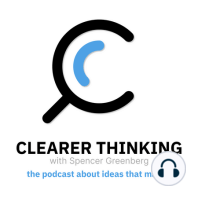119 min listen

Behind the scenes of the online dating world (with Tom Quisel)
Behind the scenes of the online dating world (with Tom Quisel)
ratings:
Length:
81 minutes
Released:
Jan 5, 2022
Format:
Podcast episode
Description
Read the full transcriptHow do men and women differ in their approach to online dating? How do online dating services deal with the fact that men send many times more messages to women than women send to men? How can online dating services' recommendation algorithms avoid merely recommending the most attractive people over and over to everyone? To what extent do users of such services agree about what makes a person attractive? How do transactions and interactions on these platforms shape the way users pursue short-term and/or long-term relationships? What surprising effects emerge in aggregate as a result of these transactions? How well do people really know themselves? How well do they know what kind of relationship partners would actually make them happy? How does gay male online dating (especially on Grindr) differ from heterosexual online dating? What makes for effective management and/or leadership? Is anger a useful tool for managers? How should managers weight the importance of various hiring tools (e.g., résumés, interviews, work samples, personality tests, contract periods, etc.)? What are some tools for designing highly effective self-experiments? Is there alien life in the universe? Should we be trying to reach out to aliens?Tom Quisel is the CTO at Grindr, where he practices servant leadership and works to build a culture that values diversity, collaboration, ownership, and quality craft. He's passionate about making a positive impact on the world and is an online dating veteran with 9 years of experience in the industry, including 2.5 years as OkCupid's CTO. He has a BS in Computer Science from Carnegie Mellon, with a background in software engineering, distributed systems, data science, and machine learning. Tom lives in Santa Barbara and loves to mountain bike, explore philosophy with friends, and pursue life-long learning.
Released:
Jan 5, 2022
Format:
Podcast episode
Titles in the series (100)
Meditation and Enlightenment with Jeremy Stevenson by Clearer Thinking with Spencer Greenberg